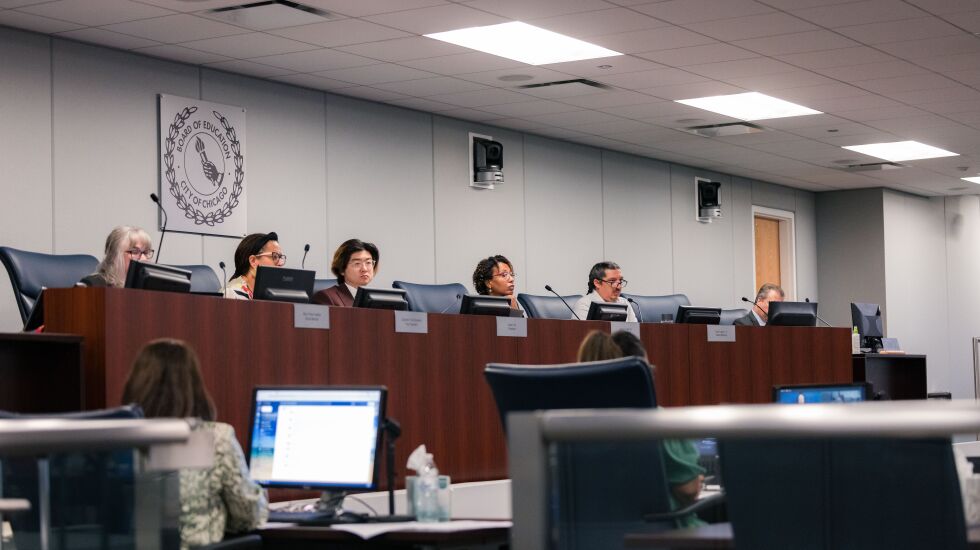
Leading Black community activists thanked the Board of Education on Thursday for its move to prioritize neighborhood schools, but they vowed to hold the school district accountable for its promises.
The school board passed a resolution Thursday that went public earlier in the week directing the school district to shift away from the current system of school choice where students compete for seats in selective programs and some 76% of teenagers don’t attend their neighborhood high school.
Many parents, students and public education advocates have long said the choice system creates “haves” and “have-nots” and leaves children competing with one another for resources and a quality education. Black communities in particular have called for better investment in their neighborhood schools.
Well-known activist Jitu Brown used to be a regular at Board of Education meetings, pushing for better schooling for the city’s Black children. He was one of several voices supporting the change of direction at Thursday’s monthly Board of Education meeting.
“I have not been to a school board meeting since 2014 when I swore off coming to a place where the voices of people impacted by public education policy were just not respected,” Brown told board members.
But he said he was optimistic for the school board’s vision — particularly because of the parent, educator and activist makeup of Mayor Brandon Johnson’s board — as long as it took a different approach by authentically listening to families and advocates in reshaping the district.
Brown said the “sustainable community schools” model that CPS will pursue can help address longtime systemic disinvestment and improve schools because it connects “community wisdom in partnership with academic expertise” by bringing community organizations in to complement curriculum. But communities need a voice in that future, he said.
In particular, Brown lamented the sort of inauthentic engagement process communities have long complained about, where district officials hold community meetings to inform parents about district policies rather than genuinely taking their thoughts into account in the formation of the policies.
“We cannot have a CPS that implements a policy in the way that it has historically done it, or you’ll mess it up,” Brown said. “This must be done in real partnership. No back room then coming to us refining it. We must inform, we must educate you.
“What we are explaining to you are real lived experiences. … That experience will not be shortchanged, or I will be one of the people to blow this thing up. It will not be shortchanged. If we are going to move in a new direction, Chicago Public Schools, you must do differently.”

Not everyone is happy with the forthcoming changes.
Christian Feaman, an official with the Illinois Network of Charter Schools, said charter schools have been serving as community schools since their inception and should not face an uncertain future.
“When we see the news stories and we read the resolution … we don’t understand,” he said.
“Attempts to claw back the basic rights of Black and Brown families to choose their child’s education goes against the inequities this board is committed to addressing,” Feaman said. “Every parent has the right to choose the best school for their child no matter the family’s income level.”
Charter schools are publicly funded but privately managed schools whose supporters tout as hubs of innovation without government bureaucracy that could produce better results with less money. Some 50,000 students attend charters at CPS. Dozens of these schools are up for contract renewals in January.
Charter growth has stagnated in Chicago, and critics say charter schools are effectively drawing resources away from traditional public schools that need investment.
The Board of Education reiterated Thursday that its resolution to reprioritize neighborhood schools doesn’t mean the imminent end of charters, selective enrollment or magnet schools, and that no schools are facing closure. But the whole portfolio of schools will be examined, leaders said, to find the best approach and give kids in every community access to a quality school near their home.
“Our current system of school choice sorts students based on test scores and other things,” Board Vice President Elizabeth Todd-Breland said. “Research has demonstrated the harm that’s caused by this sorting.
“Students have consistently expressed how much this sorting has harmed their sense of self-worth, their sense of self-esteem, their confidence as learners, their feeling of belonging within whatever school community they might be in. … Parents have lamented the way we test 4-year-olds for school choice, the competitive nature of our choice system and have compared it to the ‘Hunger Games.’”
Todd-Breland said the board recognizes that charter schools are part of CPS’ fabric and is “not proposing blanket non-renewals of all charter schools.” But the board wants to hold charter operators accountable.
And she pointed out that magnet and selective enrollment schools, initially meant to desegregate schools, have more recently become more segregated.
“[This] is not about closing selective enrollment schools,” she said. “It is about a shift towards emphasizing supporting neighborhood schools, particularly in those communities that have been historically disinvested in and where young people are furthest from opportunity.”







